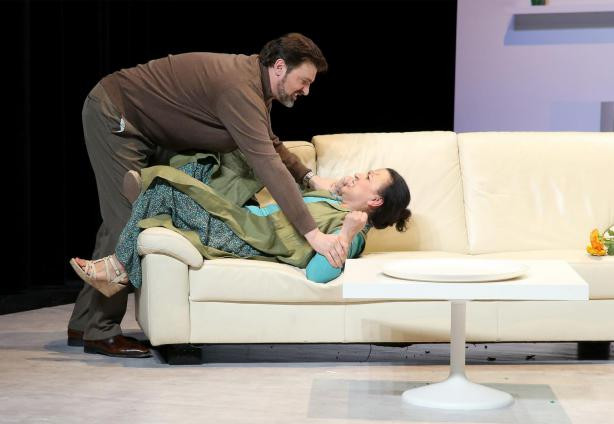It is always exciting to see new ventures in theatre, and the debut production by the Actors Rep company didn’t disappoint. Formed last year by American residents Timothy Lone and Erik Abbott, Actors Rep is an independent professional company that hopes to eventually put on a full professional season.
It chose as its launchpad a play that is challenging, to say the least. Edward Albee’s The Goat, or Who Is Sylvia? tackles themes that leave audiences grappling with their moral compass.
The play opens on a cleverly designed set by Karl Pierce, a living room of all white angles dominated by a modern art canvas that is not what it seems. We meet the middle-aged, middle-class couple Martin and Stevie. He, played by Timothy Lone, is a successful architect at the pinnacle--the crest--of his career who has just reached the landmark age of 50. She, Louisa Graf, is a lively foil to his razor-sharp, sometimes pedantic, obsession with correct grammar. They are preparing for the arrival of Martin’s oldest--longest--friend, Ross (Alexander Thomas), who is to interview the architect for a programme titled People Who Matter.
As we will see later, it is not just people who matter in this play--though the title does somewhat give the plot away so that even before Martin’s first, playful, confession to Stevie, that audience is fully aware that he is having an affair with a goat. Yes, having an affair--not simply engaging in bestiality, but actually in love and obsessed with a particular goat whom he has named Sylvia. Stevie, in equally playful mood, dismisses his confession as a joke. But Ross, to whom Martin confesses later, takes things much more seriously--with the, almost, inevitable tragic consequences.
As critic Edward Scheer pointed out in Australian magazine The Monthly, the goat in the play is “what Alfred Hitchcock called the MacGuffin: the trivial detail…around which the entire plot centres, but which is merely the trigger for the thematic sweep of the whole work.” Because the best and most powerful scenes here involve Martin arguing, sometimes futilely, sometimes with wit and guile, sometimes with desperate honesty, that his love for Sylvia is genuine and unstoppable and yet in no way diminishes how he feels about Stevie, or, indeed, about his gay teenage son Billy (newcomer Bram de Vet).
Albee has composed some splendid set pieces in the play, and the dialogue is as sharp and clever as we have come to expect from the playwright. The theme gets right under the audience’s skin so that brilliant repartee is often followed by howling accusation, cracking one-liners (which even at the height of their rage Martin and Stevie stop to acknowledge of each other) lead to inconsolable heartbreak. This is exactly the effect Albee wanted. He said in an interview in the Washington Post some eight years ago: “I love the laughter that finally catches in the throat, and you suddenly realize, ‘I'm not supposed to be laughing.’”
It is a text that, in the hands of the right cast, skilfully twists and turns its arguments so that the tragic end leaves us flabbergasted and drained. And the cast here is right--delivering almost faultless performances throughout. Lone is suitably confused, arrogant and intellectually middle-class, dressed all in browns and beiges to contrast neatly with the colourful blues and turquoises of Stevie and Billy. At one stage Billy even talks about the colourless normality of his friends’ parents.
Graf is a whirlwind of emotion as the betrayed wife; the lover who has had the rug pulled out from under her and is wrought with anger and disappointment. She delivers a captivating performance that is totally believable. Thomas is also engaging and wonderfully natural as the sickened friend who is shocked by what he hears--even though Ross has quite clearly been less than faithful to his own wife. Unlike the two leads, his supposedly morally upright character elicits little sympathy. The young de Vet does elicit the most sympathy and shows great promise.
This is a production that is perfectly paced by director Erik Abbott and beautifully staged. He has drawn out the full range of humour and tragedy from Albee’s text and leaves the audience asking questions about love, lust and the nature of sexuality. Questions provoked expertly by the cast and left lingering even as the play reaches its terible climax.
The Goat or Who Is Sylvia is being played on Wednesday June 5 and Thursday June 6 & Monday June 10-Wednesday June 12 at the Théâtre National du Luxembourg, route de Longwy, Luxembourg-Merl.
